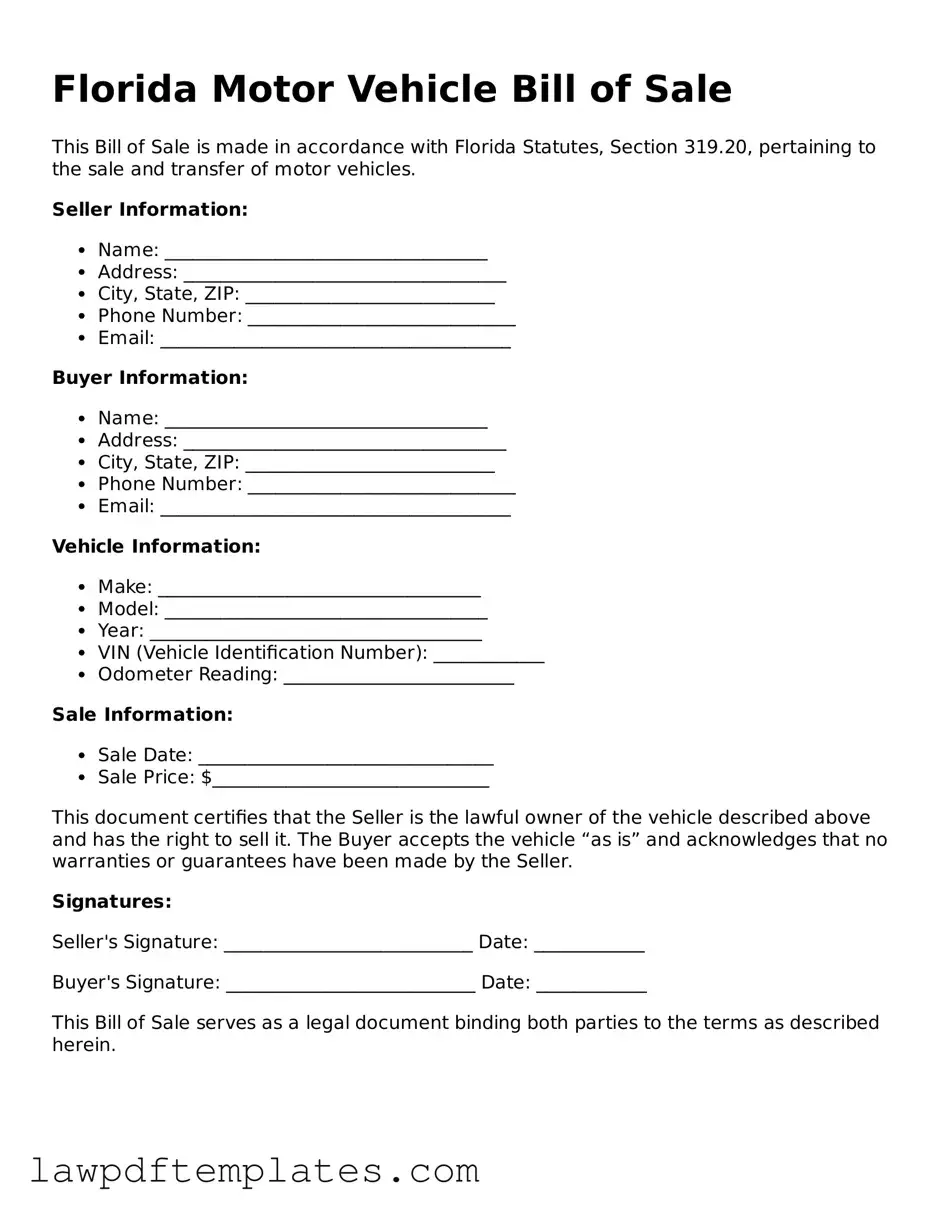Free Motor Vehicle Bill of Sale Template for the State of Florida
Form Breakdown
| Fact Name | Description |
|---|---|
| Purpose | The Florida Motor Vehicle Bill of Sale form serves as a legal document that records the sale of a motor vehicle between a buyer and a seller. |
| Governing Laws | This form is governed by Florida Statutes, specifically Chapter 319, which outlines the regulations regarding the transfer of vehicle ownership. |
| Required Information | Essential details such as the vehicle identification number (VIN), make, model, year, and the sale price must be included in the form. |
| Notarization | While notarization is not mandatory for all transactions, it is recommended to enhance the document's credibility and provide additional legal protection. |
| Usage | This form is commonly used when buying or selling cars, trucks, motorcycles, and other motor vehicles in Florida. |
Sample - Florida Motor Vehicle Bill of Sale Form
Florida Motor Vehicle Bill of Sale
This Bill of Sale is made in accordance with Florida Statutes, Section 319.20, pertaining to the sale and transfer of motor vehicles.
Seller Information:
- Name: ___________________________________
- Address: ___________________________________
- City, State, ZIP: ___________________________
- Phone Number: _____________________________
- Email: ______________________________________
Buyer Information:
- Name: ___________________________________
- Address: ___________________________________
- City, State, ZIP: ___________________________
- Phone Number: _____________________________
- Email: ______________________________________
Vehicle Information:
- Make: ___________________________________
- Model: ___________________________________
- Year: ____________________________________
- VIN (Vehicle Identification Number): ____________
- Odometer Reading: _________________________
Sale Information:
- Sale Date: ________________________________
- Sale Price: $______________________________
This document certifies that the Seller is the lawful owner of the vehicle described above and has the right to sell it. The Buyer accepts the vehicle “as is” and acknowledges that no warranties or guarantees have been made by the Seller.
Signatures:
Seller's Signature: ___________________________ Date: ____________
Buyer's Signature: ___________________________ Date: ____________
This Bill of Sale serves as a legal document binding both parties to the terms as described herein.
Common mistakes
When completing the Florida Motor Vehicle Bill of Sale form, it’s easy to overlook important details. One common mistake is failing to provide accurate vehicle information. This includes the vehicle identification number (VIN), make, model, and year. Each of these details is crucial for proper identification and registration. If any of this information is incorrect, it could lead to complications down the road.
Another frequent error is neglecting to include the sale price. The form requires a clear statement of the sale amount. Leaving this blank or entering an incorrect figure can create confusion and may even lead to tax issues later. It's important to ensure that this information is complete and accurate.
People often forget to sign the document. Both the seller and the buyer must sign the Bill of Sale for it to be valid. Without these signatures, the transaction may not be recognized by the state, which can lead to problems with registration or transfer of ownership.
Additionally, some individuals fail to provide their contact information. Including a phone number or email address can be beneficial if any questions arise after the sale. This simple step can help maintain clear communication between the buyer and seller.
Another mistake is not dating the document. The date of the sale is important for both parties. It establishes when the transaction took place, which can be relevant for tax purposes and for determining the start of the warranty period, if applicable.
Many people also overlook the need for a witness or notary. While not always required, having a witness or notarization can add an extra layer of legitimacy to the document. This can be particularly helpful in case of disputes in the future.
It’s also essential to use the correct form. Some individuals mistakenly use a generic Bill of Sale instead of the specific Florida Motor Vehicle Bill of Sale form. Each state has its own requirements, and using the wrong form can lead to issues with the title transfer.
Some sellers fail to disclose any liens on the vehicle. If there are outstanding loans or claims against the vehicle, these must be revealed to the buyer. Failing to do so can result in legal issues later on.
Lastly, people sometimes forget to keep a copy of the completed form. It’s advisable for both the buyer and seller to retain a copy of the Bill of Sale for their records. This document serves as proof of the transaction and can be useful for future reference.
Discover More Motor Vehicle Bill of Sale Templates for Specific States
Vehicle Bill of Sale Form - Important for registering the vehicle in the buyer's name.
By having a versatile Power of Attorney document, you can ensure that your financial and health-related decisions are made according to your wishes during critical times. Explore the importance of this legal tool and understand how it can protect your interests by visiting our page on the necessary Power of Attorney considerations.
Do I Need Bill of Sale to Transfer Title - Can clarify terms of service agreements related to the vehicle.
Boat Bill of Sale Massachusetts - Aids in obtaining appropriate insurance coverage after sale.
Dmv Bill of Sale - Buyers can use this document to register the vehicle in their name after purchase.
